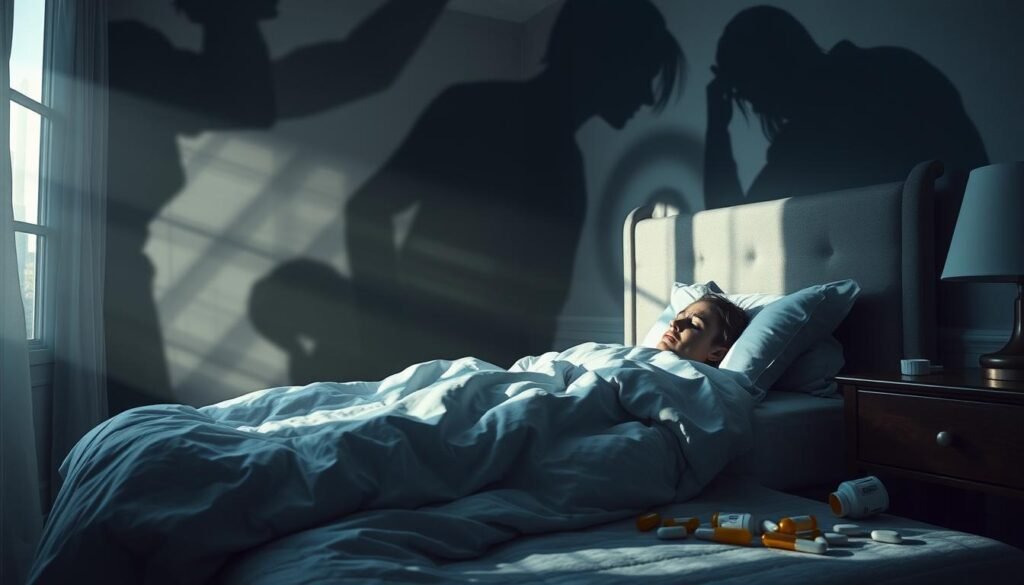Approximately 40% of people in the United States struggle with a lack of vitamin D. This fact is worrying, especially since insomnia impacts 10% to 30% of adults. Meanwhile, around 57.6% of adults have tried dietary supplements in the last month. This begs the question: could vitamin D supplements be the key to better sleep for those with sleep issues? This piece looks closely at how insomnia and vitamin D are connected. It explains how these supplements might help many people suffering from sleep problems.
Key Takeaways
- Insomnia affects 10-30% of the adult population.
- About 40% of Americans have a vitamin D deficiency.
- Vitamin D supplementation may significantly improve sleep quality.
- The connection between vitamin D and melatonin plays a key role in sleep regulation.
- Consulting with a healthcare provider is recommended before starting vitamin D supplements.
Understanding Insomnia and Sleep Disorders
Insomnia makes it hard to fall or stay asleep, affecting 10-30% of adults. It’s part of various sleep disorders like obstructive sleep apnea and restless legs syndrome. Insomnia and these disorders can lead to serious sleep deprivation. This can hurt your cognitive abilities and lower your quality of life.
It’s vital to understand what causes insomnia. Stress, drinking caffeine, and hormonal changes can disrupt sleep. By adopting good sleep hygiene and managing stress, people can sleep better. Improving sleep doesn’t just make you feel better; it also boosts brain function and mental health. And, with sleep being linked to long-term health issues, like heart disease, finding ways to beat insomnia is crucial.
In the U.S., many people suffer from sleep disorders. Such issues can lead to worse health. Eating well and taking certain vitamins might help with sleep problems. To learn how vitamins affect sleep, check out this resource.
The Importance of Sleep Quality
Sleep quality is crucial for our health and happiness. It affects both our minds and bodies, offering rest and recovery. A restful night helps with healing, staying balanced, and thinking clearly.
Our body’s internal clock, or circadian rhythm, manages sleep quality. It controls our sleep patterns and body functions. When this cycle is off, it can cause mood issues, lower work performance, and increase disease risks.
Studies show a link between vitamin D and sleep. People with low vitamin D often sleep less and feel more tired during the day. High vitamin D levels correlate with better sleep quality.
It’s critical to maintain healthy vitamin D levels. Aiming for 40 to 100 ng/mL can lead to improved sleep. Those low in vitamin D may have trouble sleeping soundly. So, enhancing vitamin D levels could greatly improve sleep and overall well-being.
Vitamin D and Its Role in Health
Vitamin D is key for our health, more than just for bones. Many people in the U.S. don’t get enough of it. Studies link low vitamin D to bad sleep and more tiredness during the day.
This vitamin mainly comes from the sun hitting our skin. You can also get it from foods like fatty fish, dairy, and egg yolks. Having enough vitamin D boosts your immune system and might protect against some diseases.
Taking extra vitamin D can help your bones and improve sleep. Adults should get 600 IU daily, or 800 IU if they’re over 70, says the Institute of Medicine. But don’t take more than 4,000 IU.
Around one billion people worldwide don’t get enough vitamin D. This lack can lead to more infections and autoimmune problems. Having the right amount of vitamin D is key for good sleep and staying healthy.
Link Between Vitamin D Deficiency and Sleep Issues
Recent research has shed light on how low vitamin D affects sleep. It turns out, not having enough vitamin D can lead to restless nights. This includes sleeping for shorter periods and waking up often during the night. For example, kids lacking vitamin D tend to go to bed late and may face obstructive sleep apnea. This suggests young ones are especially at risk of poor sleep.

A deep dive into studies about kids and vitamin D showed something worrying. When looking at 748 articles, 14 studies made it clear. They linked not having enough vitamin D to problems like not sleeping enough. Kids with too little vitamin D might face restless leg syndrome and insomnia. This tells us vitamin D is crucial for good sleep.
Also, data revealed about 90% of people in the UK don’t get enough vitamin D during colder months. With 60% having low levels, this issue isn’t just in one place. It’s a wide problem that makes sleep difficult for many.
One possible solution? Eating more foods rich in vitamin D. Boosting vitamin D intake can help ease mental stress and other psychological issues. As researchers keep studying, understanding how vitamin D affects sleep length is key. This is especially true for groups that are more at risk.
The Connection Between Vitamin D, Melatonin, and Sleep
Vitamin D plays a big role in melatonin levels, which are key for sleep regulation. When your body has enough vitamin D, it can make melatonin better. This helps you keep a healthy sleep cycle. Not having enough vitamin D can lead to less melatonin and sleep problems.
Studies show that people with low vitamin D often struggle with sleep. An analysis of 19 studies found Vitamin D Supplementation (VDS) helps improve sleep. It mainly reduced sleep disturbances, showing the benefits of VDS for good sleep.
Vitamin D does more than just help with melatonin production. It also affects how our body makes serotonin and melatonin. This shows how vitamin D and melatonin levels work together. For more, check out the full analysis.
Melatonin is made at night and relies on daytime vitamin D, which we get from the sun. This means not getting enough sun can mess up your sleep cycle by lowering melatonin.
It’s crucial to have enough vitamin D for your health and sleep. If you don’t have enough, you may face sleep issues. So, keeping track of your vitamin D levels is very important.
| Age Group | Recommended Daily Vitamin D Intake |
|---|---|
| Babies (0-12 months) | 10 mcg (400 IU) |
| Children (1-13 years) | 15 mcg (600 IU) |
| Teenagers (14-18 years) | 15 mcg (600 IU) |
| Adults (19-70 years) | 15 mcg (600 IU) |
| Older Adults (71+ years) | 20 mcg (800 IU) |
Insomnia Vitamin D: How Supplements Can Help
Insomnia impacts many adults, with 10-30% having trouble sleeping. People are turning to vitamin D supplements for better sleep. This vitamin is key in many body functions, including our sleep-wake cycle.
Studies show that enough vitamin D improves sleep quality. This makes it crucial for those with insomnia. Now, over 57.6% of U.S. adults use dietary supplements. Nearly 40% of Americans don’t get enough vitamin D. So, taking extra can help with sleep problems.
Low vitamin D levels are linked to insomnia. Boosting vitamin D might ease sleep issues. It also affects melatonin, which we need for good sleep. Many studies support the benefit of vitamin D for sleep.
Vitamin D supplements are affordable and easy to find. Testing can show the right amount to take. This article helps understand how vitamins impact sleep.
| Benefit of Vitamin D Supplementation | Impact on Sleep |
|---|---|
| Improved Sleep Quality | Associated with higher vitamin D levels |
| Extended Sleep Duration | Can help reduce nighttime awakenings |
| Regulation of Melatonin Production | Essential for maintaining a healthy sleep-wake cycle |
| Potential Alleviation of Sleep Disorders | May benefit conditions associated with vitamin D deficiency |
Adding vitamin D to your daily life might help with insomnia. It may lead to a healthier sleep pattern. As research continues, we may learn more ways to improve sleep quality.
How to Determine Your Vitamin D Levels
Knowing your vitamin D levels is vital for good health. Roughly one in four people have vitamin D levels that are too low. A blood test is the best way to check these levels. This test checks the 25-hydroxyvitamin D in your blood, giving a clear view of your vitamin D status.
To understand your blood test results, know how vitamin D levels are categorized:
| Status | Serum Level (ng/mL) |
|---|---|
| Deficient | |
| Insufficient | 20-29 |
| Sufficient | 30-100 |
| Toxic | Over 100 |
If you find out your vitamin D levels are low, talk to health professionals. They can guide you on supplementation needs, diet changes, and how to safely get sun. It’s crucial to follow their advice carefully to avoid too much vitamin D, which can be harmful.
People at risk of low vitamin D, like older adults or those not getting enough sun, should check their levels often. Eating foods high in vitamin D, like egg yolks and fish, can also boost your levels. For more on the dangers of low vitamin D, see this resource.
Recommended Vitamin D Supplements and Dosage
Vitamin D supplements come in many forms, including capsules, tablets, and oils. What you choose depends on your personal taste and health needs. The right vitamin D dose varies depending on age, lifestyle, and health.
For most adults, taking 400-800 IU or 10-20 micrograms (mcg) of vitamin D supplements daily is a good start. Many experts suggest that 1,000-4,000 IU (25-100 mcg) a day is best for optimal vitamin D levels. Having a blood level of about 30 ng/mL (75 nmol/L) might lower the risk of some cancers and bone problems.
Some people need more vitamin D. This includes older people, pregnant women, and those with dark skin. They might need higher doses to stay healthy. Foods like cod liver oil and salmon are good sources, but sun exposure is also important.
Always talk to a doctor before starting vitamin D supplements. A healthcare professional can offer supplementation guidelines that fit your health and blood tests. They’ll help you find the right recommended dosages to avoid too much vitamin D.
| Population Group | Recommended Dosage (IU) | High Dosage Considerations |
|---|---|---|
| Healthy Adults | 400-800 IU | 1,000-4,000 IU for optimal levels |
| Older Adults | 800-1,000 IU | Higher quantities depending on individual needs |
| Pregnant/Breastfeeding Women | 600-800 IU | Consult with a healthcare provider |
| Individuals with Dark Skin | 600-800 IU | May require higher doses |

Natural Remedies for Sleep Disorders
Natural remedies play a big role in better sleep and handling sleep disorders. Adding these remedies usually means changing your lifestyle to improve overall health. Making sleep hygiene a priority helps set up the right environment for good sleep, which is key for feeling refreshed.
Starting with a regular sleep schedule helps keep your body’s clock in rhythm. The sleeping environment is crucial for good sleep; having a room that’s dark, cool, and silent helps you relax. Making small changes like reducing light exposure and not having electronics close to your bed can make sleeping better.
Natural supplements can help you enjoy restful nights. Options include:
- Melatonin: It helps control your sleep-wake cycle, making it easier to fall asleep and stay asleep longer. However, be careful as it might cause daytime sleepiness and dizziness.
- Valerian Root: This herb helps you relax and might improve sleep, but for some, it leads to headaches and upset stomach.
- Chamomile: Drinking chamomile tea can better your sleep quality and lower anxiety.
- Passionflower: Research shows passionflower might help you sleep longer and more deeply, especially as tea.
- Magnesium: Having enough magnesium is crucial for sleeping well. Supplements might help, but watch out for side effects like stomach cramps.
Using natural remedies along with a diet rich in vitamins B, C, and D supports healthy sleep. Eating foods high in these vitamins, like fish or nuts, helps with sleep patterns. Also, practices like light therapy, yoga, and meditation can greatly improve sleep quality.
Music therapy is becoming popular for improving sleep quality. Listening to calming music before bed can reduce waking up at night, making the sleep experience better.
Finding the right mix of lifestyle changes and natural remedies can make a big difference for those struggling with sleep problems. Focusing on sleep hygiene, eating well, and using supplements can lead to more peaceful nights.
| Natural Remedy | Benefits | Potential Side Effects |
|---|---|---|
| Melatonin | Regulates sleep-wake cycle | Daytime drowsiness, dizziness |
| Valerian Root | Promotes relaxation | Headaches, GI discomfort |
| Chamomile | Improves sleep quality | Allergic reactions (rare) |
| Passionflower | Enhances sleep duration | Headache, dizziness |
| Magnesium | Supports sound sleep | Stomach cramping, nausea |
Impact of Seasonal Affective Disorder on Sleep
SAD seriously affects our sleep, especially in winter. This problem is due to less sunlight, which means less vitamin D. In Northern America, up to 9.7% of people suffer from it when the days grow shorter.
Winter brings many sleep problems. People may oversleep, feel very tired, and eat less or more than usual. These issues make us feel sluggish and down. It’s mostly women who get hit by SAD, with them being more likely to suffer than men.
SAD symptoms usually hang around for 4 to 5 months. Places with less daylight, like Alaska and New England, see more of these problems. If you already struggle with mood swings or depression, you’re at a higher risk.
There are good treatments for SAD, like light therapy and CBT-SAD. These can help with the vitamin D deficiency and make you feel better. But it’s critical to really understand SAD to avoid worse problems later.
| Factor | Details |
|---|---|
| Symptoms Duration | 4-5 months annually |
| Prevalence in Women | 3.5:1 to 9.0:1 ratio compared to men |
| At-Risk Populations | Younger adults and individuals in less sunny regions |
| Treatment Options | Light therapy and CBT for SAD |

Conclusion
Insomnia and vitamin D deficiency are closely linked, showing how vital sleep health is. Studies have shown that the right vitamin D levels can lead to better sleep. This, in turn, boosts overall well-being. Studies also find that getting enough vitamin D helps with insomnia symptoms and supports a stable sleep-wake cycle. This cycle is key for feeling good during the day.
Checking vitamin D levels can help manage sleep problems. Experts often say that having 25OHD levels above 30 ng/mL is best for health. With lifestyle changes and vitamin D pills, improving sleep and life quality is easier.
Trying different approaches, like changing your diet or getting more sunlight, could improve sleep issues. Making sleep a key part of health allows people to manage their sleep better. To discover more about how some medications impact sleep, read this useful article on medications that may affect sleep.